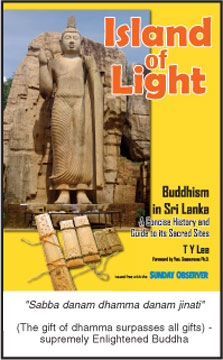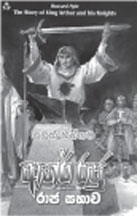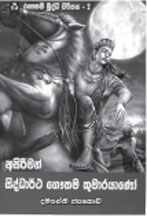|

SUNDAY OBSERVER gifts Buddhist book
Reviewed by Kalakeerthi Edwin Ariyadasa
In a pleasantly surprising gesture, The Sunday Observer gifted a book
to its readers. It is not just any book either. The book that was
distributed free, reflected the spirit of the times. In the season, that
is dedicated to the celebration of the 2600th anniversary of the Supreme
Enlightenment, the free book presented by the Sunday Observer was on
Buddhism in Sri Lanka. Its main title reads Island of Light. In the
explanatory sub-titles, the content of the publication is further
elaborated: "Buddhism in Sri Lanka. A concise history and guide to its
sacred sites."
The author of this slim publication is T.Y. Lee - a keen follower of
Buddhism. A citizen of Singapore, author T.Y. Lee's avowed mission is to
make a continuing effort towards the uplift of Buddhism.
Impressive compliment
The author begins his prefatory note, with an impressive compliment
to Sri Lankans. These are his words:
 "This book is written in tribute to the people of Sri Lanka for their
contribution to the preservation and spread of Buddhism within their own
island and beyond." "This book is written in tribute to the people of Sri Lanka for their
contribution to the preservation and spread of Buddhism within their own
island and beyond."
Writer T.Y. Lee, displays a keen sensitiveness towards the
fluctuations of the history of Buddhism in Sri Lanka, throughout the
centuries.
His 72-page volume is in two parts. In the first part of the book,
the author traces the history of Sri Lanka. Here he narrates the story
of the island of Sri Lanka, deriving much of his material from the
national chronicles - Mahawamsa and culawamsa .
What is exceptionally commendable about this book is its highly
practical structure.
The material is presented in an easily assimilable format. Evidently,
the work is primarily intended as a ready vade mecum for those who visit
Sri Lanka on pilgrimage or as tourists. But, even the Sri Lankan reader
will be grateful to author T.Y. Lee for these lucid notes, which makes
their point pithily and memorably.
Developments
The book, authoritatively highlights, the main developments in
Buddhist history of Sri Lanka. The author dwells on the fortunes of
Buddhism and its temporary decline, when foreign powers - the
Portuguese,the Dutch and the British invaded Sri Lanka.
The author records how the lustre of Buddhism dimmed for a while,
when the sacred island was under the sway of British imperial rule.
Writer T.Y. Lee, devotes several spirited sections to recount the
initiatives of popular movements, that relentlessly exerted, to counter
the vicious efforts to destabilize the deeply entrenched sway of
Buddhism.
The key-role played by the vigorously polemical Buddhist monk, Ven.
Migetuwatte Gunananda Maha Thera in the globally renowned series of
Christian-Buddhist debates widely known as "Panadura Vadaya" is apply
highlighted by the author, as a crucial turning-point in the subsequent
Buddhist revival.The author adorns this description, with a quaint
illustration, that records an artist's impression of the main
participants in this historical and religious polemical encounter.
Buddhist Renaissance
The author responsibly observes, that, it is this debate, that set
the stage for the emergence of such stalwarts as Colonel Henry Steele
Olcott and Anagarika Dharmapala in the globe-girdling Buddhist
Renaissance, that came in the slip-stream of the debates.
In the segment titled "Upto the Present", (pages 25-29) the author
focuses his attention on several outstanding Buddhist savants, who took
to the spreading of the word of Buddha world-wide, with an astonishing
zeal.
While making due references to the ever-fresh services of Ven. Madihe
Pannasiha Nayaka Maha Thera and Ven. Narada Maha Thera, the author turns
his attention to the unparalleled exertions of Ven. Dr. Kirinde Sri
Dhammananda Nayaka Maha Thera. Along with those, he remembers Ven. M.M.
Mahaweera Nayaka Maha Thera as well.
But, about author T.Y. Lee's book, there is the particular point,
that, I just cannot understand.
Being an ardent Buddhist, and a citizen of the city state of
Singapore, I just cannot see how he missed the massive religious
services of the Singapore Buddhist Meditation Centre.
For several decades, the Chief Prelate of the Singapore Buddhist
Meditation Centre, Ven. Weragoda Sarada Maha Thera has steadily brought
out a whole series of important Buddhist tomes. His English rendering of
Dhammapada titled "treasury of Truth," created publishing history in
Singapore, when it elicited more than 2,000 telephone calls on the day
it was officially launched. This phenomenon was reported in Shaits
Times.
Buddhist themes
He brought out nearly one-hundred print media books and several
E-books on Buddhist themes. These publications, (most of which are
edited by Edwin Ariyadasa) have proved a Buddhist publishing sensation.
I hope, that, in a subsequent edition of the present work, author
T.Y.Lee will look at these Singapore Buddhist Publications and their
contribution towards the spread of Buddhism, worldwide.
Ven. Dr. P. Gnanarama Thera who writes the FOREWORD to this work,
participated actively in the Buddhist initiatives of the Singapore
Buddhist Meditation Centre.
The second part of author T.V. Lee's book is a noteworthy guide to
some of the sacred sites in Buddhist Sri Lanka. Those who travel to Sri
Lanka in holy tours, will esteem this book.
I deem it proper to felicitate "The Sunday Observer" for this valued
free gift. Generally, most of the inserts in Sunday newspapers, tend to
be on tinset-dazzle issues.
But, with this free gift, the Sunday Observer has made a fresh
publishing gesture. The Sunday Observer, I am sure, will continue to
enrich readers with such profound gifts as these.
University fresher's traumas of transition
Reviewed by M. B. Mathmaluwe
The title page of this writer's copy of Dr. Siri Gunasinghe's (SG)
Sinhala Novel, "Hevanella" bears '1960' as the year of the publication
of its first edition and, at the end of its 147 - page text, it carries
my inscription, 'Re-read:1983', which means, the allure of its story had
not been lost to this reader even after 23 years: it speaks for itself;
and, now after 50 years (2010), its English translation has appeared in
the bookstalls. It has taken half a century, but this writer feels, the
quality of Dr. Ms. Hemamali Gunasinghe's translation ('The Shadow') is
well worth the long wait for it.
It is not intended here, to speak of the Sinhala book at any length,
except to say that when it first appeared in 1960, it took the Sinhala
reading public quite by surprise for, it may safely be said, nothing of
its genre had been seen before by them and so, no wonder, their critical
response was on a very wide spectrum; but it was seen, some writers of
repute in this country, like Martin Wickramasinghe, it was evident from
their comments, had taken it as a landmark work.
SG's novel, The Shadow, in essence, is a comprehensive analytical
study of the workings of the mind of a university fresher trying to
adjust himself to the changing circumstances of the new environment he
has entered; the violent trauma he goes through in the process forms the
warp and weft of the web that SG weaves as his story, of the responses
and reactions of the new university entrant, Jinadasa caught in an
irresistible tornado of events and circumstances which turn out to be
the absorbing saga of the tortured soul of Jinadasa trying desperately
to reorient himself but, in the end, submitting to forces too
overwhelming for him to overcome.
In this conflict of forces the traditional entrenched values of a
conservative Sinhala Buddhist society on the one hand and, on the other,
the sophisticated neo-urban cultural values are at issue.
New environment
The new forces emerging, in which Jinadasa is caught from the moment
he enters the new environment, the university, start the process of
wearing down the many inhibitions with which he has come which are now
in imminent danger of being breached: they are the traditional codes of
conduct which has been inculcated in him from his childhood in the
village under two main formative influences: his mother at home, and the
Buddhist monk in the village temple.
His first natural reaction to these new forces is violent resistance
true, but their siege on his defences is relentless and sustained and
they slowly but steadily crumble.
Therefore his first vacation at home from university is a restless,
twilight period; he is already beginning to feel alienated; his first
inclination is to break loose from the umbilical cord of his mother's
domination and other fetters of traditional discipline which he felt,
were standing counter to his new found ways of freedom. The on-going
battle between his former id and his present one, is violent where the
new is trying to assert itself.
In the meantime, the transformation of Jinadasa is moving ahead; the
transgressions against the former concepts and practices are consequent
upon the new system of values, right and wrong that are slowly building
in him:
"He remembered the university. He began to feel he had enjoyed some
measure of freedom there... don't have the same freedom here. (p.42) The
magnitude of the battle raging within him could be judged when he says:
"Two hours of struggle to concentrate on his reading had gained him
nothing."
One important feature of this book is that the author makes an
in-depth study of Jinadasa's mind, the cataclysmic upheaval taking place
from the time he enters the university: formerly, his quiet,
routine-bound life at home, school and the temple, where every
convention of conduct was laid down for ever. Now, in the university,
left to himself, he is free to do as he pleases. Surrounded by a totally
different environment, he is caught in a confluence of the multiple
cross-currents of new concepts, values and practices: there is an
on-going battle within his psyche as to which values are to be accepted
and, which are to be discarded; it may readily be realised that this is
not anything new; it always happens when an individual transfers from a
group with its own set of values and practices laid down, to another
with a different set of values, the adjustment before final causing some
amount integration, of inconvenience to the individual. In such
situations, the tendency, more often than not, is for the new values and
practices to supersede the old of the old values thrown into the
melting-pot, under the fires of new influences, new beliefs and values,
will be forged.
Colourful personality
The new influences laying seige upon Jinadasa's mind now, are derived
from the multiplicity of Personalities, their word, thought and
practices who surround him at the university and his new boarding house
at Bambalapitiya, to which he has now shifted, unknown to his mother and
Kalutara aiya, who had found for him the earlier boarding house at Mt.
Lavinia.
His new boarding house is run by a Burgher woman, reputedly, of a
shady character. Here, he comes under the strong influence of a fellow
boarder, Weerasekera, popularly known among the other boarders as
'Uncle' Weerasekera, a colourful personality, with his wide and
variegated experiences, who had seen something of the world; a confirmed
bachelor, the influence of his views on life and love, of men and women,
more so of women, on the juvenile mind of Jinadasa was tremendous; he
had loved, in all its seriousness, a woman, and lost and now he has
turned into a misogynist and a synic in his attitude to life.
SG introduces to the reader several characters, both men and women
though not unique for, their prototypes can be found in any society, yet
each of them is marked out as a different individual by his
ideosyncracies of thought and conduct. It needs no saying that this
enhances the stature of the book as a portrayal if true human society:
SG's men and women come not only from the village homes and the temple,
but also from the streets, the tavern and the brothel: for instance, the
beggar women huddled against a wall on the Bambalapitiya pavement, as SG
points out is a case of what happens to women when beauty and poverty
combine. Such types transcend both time and place.
In the story of Jinadase's transformation, the 'Lion House' of Galle
Road, in the late forties and the early fifties of the last century,
plays an important part. At this point, if a brief digression may be
allowed, creative literature with this period as its backdrop, whether
it be Sinhala or English, features the 'Lion House' as a focal point for
university students to fore gather, where the collective influence of
diverse views, social, cultural or academic, goes along way to build the
personalities of the university students as they go out into the world
from where they carry lasting impressions gathered in those formative
years.
The role that the 'Lion House' has played in the impressionable minds
of University students of the time, seems to be a fertile ground to
spawn a research study for a student of sociology, preferably a
contemporary alumnus of the Colombo University for much authentic
information lies scattered in numerous books and journals by students of
that time.
Traditional systems
Away from their homes and potential supervision, cut off from the
sestraints exercised by traditional systems of values, and continually
exposed to the winds of change from their present surroundings, the
freshers as the callow youths that they are infact, take these new
influences like a potent wine that has gone into their head. It is the
time their old values, beliefs, facts foibles, take a severe beating
and, at the end of their 3-5 years of life in this crucible of change,
it is inevitable that the chrysalis would have turned into an image, a
totally different creature.
But the re-orientation of Janadasa's for me it is not possible
without a total repture with his past; the childhood discipline he had
acquired at home, his rural background and in the temple; the
restrictive set up in him must now be demolished, more so, his mother's
overidling dominance. Rightly enough, it was at this time that
Jinadasa's friends found him reading D.H. Lawrence's "Sons and lover's"!
Jinadasa soon becomes a rebel against authority, from which over quarter
it came whether it was from his mother, priest, friends or relatives.
What SG says through his protagonist about love, woman and sex, is
important for, it opens a window, as it were, to understand their
significance to men and women understood so differently by each in their
many facets and dimensions. It all shown how complex these matters can
be, more so to a developing mind like Jinadasa's: how confusing it is to
judge what is right and wrong in sexual morality; how difficult it is to
pronounce judgement on guilt or innocence in sexual conduct.
It is not known for what particular merits in the work, the judges
decided to award the Don Pedrik Prize for SG's Sinhala book, 'Hevanella'
when they did so. They may be different to those I have found in it.
However that may be, to this writer's mind this book presents a serious
comment on a matter that has always been a primary concern of the human
mind, sexual morality in organised, civilised human society. All in all,
what can be stated is that SG propounds here, in all seriousness a new
sexual morality, which, it may be stated right away, is certainly, not
the conventional thinking on the subject. The book is important for
another reason; it discusses certain factors that have always guided
human conduct, more so, in man's relations with his fellow beings,
individually and, collectively as society; these, such as religion, sex,
moral conduct and the other eternal verities of life, involving human
relations once, economic concerns have been looked after.
Controversies
When SG creates a character like Jayaratne, for whom nothing is
sacred he in fact, highlights the controversies going on, on matters
referred to earlier. Readers have to remember that Jayaratne plays the
role of mentor to Jinadasa. As the story unfolds the watching image of
Jinadasa being built by SG, readers realise how, under the influence of
men like Jayaratne, among the numerous other winds he is caught in,
Jinadasa rapidly loses his pre-university identity that of the obedient
son disciplined by his mother, the village temple and the traditional
Sinhala Buddhist values. There is now a pitched battle going on between
the old entrenched forces and the new, in his mind.
In a piece of rare literary excellence, SG makes a veritable
psychoanalytical study of Jinadasa's mind, the conscious and the
sub-conscious: its workings under the overwhelming pressures generated
by his love for his girlfriend, Kanthi. His studies, lectures, books,
exams, the latter looming ahead, are all gone to the limbo of forgotten
things! His love for this woman is nothing less than an enslavement. SC
makes a masterly exposition of the illiad of Jinadasa's woes on account
of this infatuation, its ecstasy and the agony. His good friend,
Wijeypala, in a stormy session of 'Counselling', convinces Jinadasa of
the palpable folly of his conduct, and of the evils of his bouts of
intemperate boozing. Jinadasa now makes a honest attempt at returning to
virtue.
In the book this episode takes up one whole section (Chapters are not
marked in this book) i.e. pp. 131-143, for SG to document it, in a
meticulous and painstaking narrative.
After this, slowly, order and discipline seem to return to Jinadasa's
life, tearing off the previous month's page in the calendar, which he
had apparently not seen hitherto, is symbolic of this change over to a
new leaf. While dealing with this section, a word may not be out of
place here, on the distinctive character of this genre of writing and,
of the entire book, in general, that, there is little or negligible
'action' in this book.
On the other hand, there is a continual dialogue documented as going
on, in the hero's mind, a ceaseless, running debate with himself. The
present writer is reminded of Marcel Proust's renowned work of this
genre, "Remembrance of Past Things": Proust is a master at this genre of
writing: so much so, that one critic has said, while one part of
Proust's mind speaks, another part contradicts it and, another part
stands apart and comments on the on-going debate!
Moral strength
Unfortunately, this change on the part of Jinadasa is not complete,
he lacks the moral strength to go ahead with it, falters and returns to
the mire of his former abuses, an unconscionsable wave of guilt/sin,
begins to gnaw at his mind. He gusseses why on remembering the
admonitions of his mother which he has now transgressed. As SG says:
".....his old fears begin to raise their heads, when he goes to bed
these conflicting ideas come alive in Jinadasa's mind." ---P.173.
On finishing reading this book, if the reader makes a retrospective
survey of events from the beginning, he would realise, he had been
following the trail of the agonised soul of a young man caught in the
ebb and flow of a resurging sense of guilt, real and even imagined, in
his effort to reach resolution out of the choas seething in his mind in
a conflict of forces between the taboo-ridden traditional, and the
sophisticated, neo-urban systems of values. This battle goes on until,
much against his will, he yields to the last temptation in a Maradana
brothel! Here as he opens the door of the prostitute he finds, his
mother or, may be her memory, has followed him! he turns back and like a
maniac flees along the pavement of Maradana, still relentlessly followed
by the Shadow' of his mother's memory. SG's story concludes with that
horrendous nightmare overwhelming the tortured soul of Jinadasa.
Now, a brief word about Ms. Hemamali Gunasinghe's translation. She
conveys, not merely the transfer to the new medium (English), the
Sinhala text of the original work, she also captures the spirit of the
first author's intimate nuances of thought and their connotations:
nothing of the original is left out. Her verbal dexterity is quite equal
to the challenge before her, it is forceful if somewhat boisterous may
be when the need demands, functional, if at times, unchaste, may be once
again, when that is what is called for!
The present writer faithfully read the translators' 'Foreward' as
well as Prof. Dharmadasa's 26-page essay, may be written as an
Introduction, its first part apart, it is questionable as to how
feasible it is to include a critical comment in it, Wouldn't it
compromise another reader's independent judgement?
BOOK LAUNCH
Purushoththama
Udeni Sarathchandra's 3rd collection of poetry entitled
Purushoththama will be launched at 2.00 p.m. on June 11 at the Town Hall
Kurunegala. The keynote address will be delivered by Prof. Wimal
Dissanayake and other speakers include W.A Abeysinghe and Sunil
Govinnage.
Arthur Raju Saha Raja Sabhawa

Lalith Heengama's Arthur Raju Saha Raja Sabhava was launched at
Dayawansa Jayakody Bookshop, Colombo 10 on May 31.
Arthur Raju Saha Raja Sabhava is the Sinhala translation of the
popular English novel The Story of King Arthur and his Knights.
The book is published by Dayawansa Jayakody publishers, Colombo 10.
Asirimath Siddhartha Gauthama Kumarayano

Damayanthi Jayakody's latest Buddhist book Asirimath Siddhartha
Gauthama Kumarayano (Gauthama Buddha Charithaya - 2) will be launched at
All Ceylon Buddhist Congress auditorium, Colombo 7 on June 8 at 4 p.m.
Damayanthi Jayakody is the author of several other books including
Ape Buduhamuduruvo.
The book will be formally handed over to Ven. Kiribathgoda Gnanananda
Thera.
The Thera will also deliver a Buddhist talk on this occasion.
Asirimath Siddhartha Gauthama Kumarayano is a Dayawansa Jayakody
publication.
|

